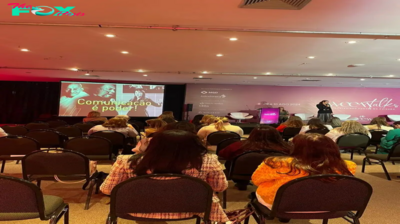Entertainment
Incoherent Deutsche Oper Berlin Don Giovanni solely partially redeemed by good singing – Seen and Heard Worldwide
 Germany Mozart, Don Giovanni: Soloists, Motion Choir, Refrain (refrain director: Thomas Richter), and Orchestra of the Deutsche Oper / Daniel Cohen (conductor). Deutsche Oper Berlin, 26.6.2024. (MB)
Germany Mozart, Don Giovanni: Soloists, Motion Choir, Refrain (refrain director: Thomas Richter), and Orchestra of the Deutsche Oper / Daniel Cohen (conductor). Deutsche Oper Berlin, 26.6.2024. (MB)
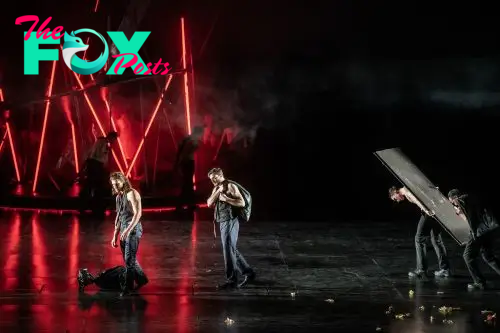
Manufacturing:
Director – Roland Schwab
Set designs – Piero Vinciguerra
Costumes – Renée Listerdal
Assistant Choreographer and Revival director – Silke Sense
Forged:
Don Giovanni – Andrzej Filończyk
Donna Anna – Flurina Stuckl
Don Ottavio – Kieran Carrel
Commendatore – Patrick Guetti
Donna Elvira – Maria Motolygina
Leporello – Joel Allison
Masetto – Artur Garbas
Zerlina – Arianna Manganello
Artist – Ellen City
We now discover ourselves within the twilight zone wherein home and corridor seasons are drawing to a detailed, however festivals have already begun. I shall flit backwards and forwards for the subsequent few weeks, albeit with higher emphasis on the latter, however right here returned to the previous, to Roland Schwab’s manufacturing of Don Giovanni for the Deutsche Oper Berlin. I noticed it when it was new in 2010 and have intentionally not regarded again, although I’ve a way that my response was considerably related: some good concepts however missing in coherence. That, at any charge, presents a snapshot of my response final evening. (I shall look again after posting.)
The opening impression is of some form of crime boss within the title function. His tightly drilled (well-choreographed, although to what finish?) entourage options all through, although I can’t say I discovered that added a lot, particularly within the unusual (drug-induced?) shaking to which lots of them typically fall prey. A way of menace is imparted, although maybe on the value not solely of distraction from the true motion, but in addition and extra significantly underlining a way that, for essentially the most half, particularly earlier on, each manufacturing and performances appear a bit of misplaced on a stage and in a home of this dimension. Different goings on, whether or not the dark-suited mob, or an admittedly arresting carnival of dying that accompanies moderately than drives the primary act’s remaining scene, generally tend to come back throughout as being put there to fill the house. The well-worn Dantean ‘Lasciate ogni speranza, voi ch’entrate’ is inscribed on a conveyable door by means of which the friends arrive (which haphazardly returns briefly, and never when one would possibly anticipate, within the second act) in a welcome recognition, not the one one, of the work’s non secular nature, however finally goes for little.
All through, a lot is completed with Golf Golf equipment, once more I suppose meant to underline the masculinity of 1 facet (and sure, I do know ladies play Golf too, although it’s not clear the manufacturing does). Different enterprise, akin to fixed wielding of whips and a great deal of different noise-making actions, present a tin ear for the fact that that is an opera, wherein not solely music however a few of Mozart’s very best music performs a hallowed function. Clearing up mess, actually with bin luggage, appears to be Leporello’s enterprise: honest sufficient, I suppose. At one level, although, the boys are in dustbins, which can sound intriguingly Beckettian, but finally ends up being one other brief part in a manufacturing that by no means appears to know the place it’s heading. What Don Giovanni’s rating card system denotes, I used to be by no means fairly certain: is a excessive rating good or unHealthy? I thought the previous, however then his remaining ‘1’ for the Stone Visitor scene would make little sense in any respect.
The viewers actually didn’t assist, laughing, chattering, and so forth, seemingly in utter disconnection from what was seen, not to mention heard. What ought to have been a really highly effective second and marked one in every of Schwab’s most imaginative concepts, Don Giovanni seating his ‘disciples’ for his final supper, the second frozen within the painterly method one would possibly anticipate, for him to interrupt bread, elicited widespread vigorous laughter. The Eucharist and/or darkish inversion thereof at the moment are apparently merely amusing. To be honest, I suppose it could clarify a great deal, and if that’s the response an try to deal with the profoundly non secular nature of the work elicits, then, God or Nietzsche assist us, maybe it’s extra comprehensible why administrators typically and, usually, disastrously keep away from it.
Why such unusual selections proceed to be made in regards to the ‘model’ I have no idea. It’s all very nicely in charge singers’ wishes to offer ‘their’ arias, however it’s not their choice and so they typically discover themselves oddly disadvantaged too; one can’t think about them having reached this settlement in any case. Nevertheless tough it might be to face the loss, the Prague model is nearly all the time preferable. When you should, and in case you have a efficiency of such calibre that it and the manufacturing can override the issues, essentially the most acquainted of the Prague-Vienna conflations, justly maligned, can work. (He stated by means of gritted tooth, pondering what would in any other case all the time be misplaced.) ‘Vienna’, insofar as we all know what it was, has latterly, unaccountably had a bizarre renaissance; it’s time for that fad to be put to mattress. Goodness is aware of what the reasoning for the mixture heard on this event was. We heard Mi tradì and Dalla sua tempo, although neither Il mio tesoro (odd, given such a tremendous efficiency of Don Ottavio’s first aria) nor the Zerlina-Leporello duet. Recitatives have been lower and typically paused, while different issues, not often if ever well worth the wait, occurred. It made little intrinsic sense, although then given the dramatic looseness of each staging and conducting, it was not significantly an issue both. Satirically, I feel manufacturing and efficiency would each have wanted to be higher or worse for it to matter extra.
For Daniel Cohen’s conducting of a Deutsche Oper orchestra that always sounded out of kinds – what a change from its latest magnificent Wagner and Richard Strauss – appeared oddly to reflect the non-committal confusion of Schwab’s staging. It started poorly, balances in a mercilessly hard-driven, tales-of-rasping-brass Overture so awry that one might barely hear the strings. Not a lot the conductor’s fault, although nonetheless dispiriting, the duet between Donna Anna and Don Ottavio within the first scene just about fell aside. Cohen was wonderful right here in selecting this up and shifting issues on, and while there have been fairly a couple of subsequent discrepancies between pit and stage, they might be on a smaller scale. When he and the orchestra actually clicked, there was some tremendous enjoying. The issue was extra that not often, if ever, within the first act and solely sporadically within the second was a basic pulse established. At greatest, we heard a string of disconnected arias, recitative typically too ‘edited’ to be of a lot use, the impression being given of ‘accompanying’ a various recital moderately than musically main the motion.
Vocally, there was a great deal to admire. The occasional mishap akin to that talked about above, there was nothing really to disappoint, though the usual of singing was not all the time so constant because it may need been. The second Maria Motolygina stepped on stage as Donna Elvira, performing voltage shot up; hers was an impressive efficiency by any requirements, boasting cleanness of line, finely modulated tone, and dramatic dedication: one I used to be delighted to listen to. Within the title function, Andrzej Filończyk was wonderful, rising in stature and defiance, to boast an enthralling efficiency in his remaining scene, helped by new-found proximity to the viewers however finally based on charisma and artistry. Joel Allison’s livewire Leporello adopted eagerly in his footsteps, no less than till then. Patrick Guetti’s Commendatore made a robust impression too. lurina Stucki’s Donna Anna typically appeared underpowered, however she recovered and made a great job of her second-act aria. Kieran Carrel’s Dalla sua tempo was as sweet-toned and mellifluous as one might want, although I by no means sensed that he was fairly contained in the function (a tough job, admittedly). I’m not certain both of those was actually her or his function. Likewise within the case of Zerlina and Masetto. Arianna Manganello and Artur Garbas sang nicely sufficient, although they may have made extra of what they needed to do; in that, they weren’t essentially helped by the manufacturing.
The worst, I’m afraid, got here on the finish, within the complete excision of the ultimate scene. Every little thing within the work and tonal expectations, particular and normal, pull it ahead; so too, nonetheless extra bafflingly, did the manufacturing appear to take action. There was, nevertheless, nowhere for it to go; it merely stopped and those that, a lot to my chagrin, have been wildly applauding have been in a way proper. Sure, Mahler did it; sure, maybe, on condition that he was Gustav Mahler, he managed to make it work; no, by any cheap requirements, he was nonetheless misguided, partial in his view of the work, surprisingly uncomprehending of its dramaturgy, to have executed so. That such an ultra-Romantic route needs to be taken made no sense in anyway in context. If the intention have been to impress dissatisfaction, that was actually achieved; I nearly hope it was, for the reason that different, sheer cluelessness, is extra miserable. Maybe it was a metaphor, in spite of everything, for our age’s unusual lack of ability even to aim to grasp this towering opera.
Mark Berry
-

 Entertainment3h ago
Entertainment3h agoThe Real Story of Geta and Caracalla, the Roman Brother Emperors in Gladiator II
-

 Entertainment3h ago
Entertainment3h agoWhat Gladiator II Gets Right and Wrong About Real Fights in the Colosseum
-

 Entertainment4h ago
Entertainment4h agoSki Area Officially Opens the Ski Season For New York
-

 Entertainment8h ago
Entertainment8h agoGladiator II Belongs to Denzel
-
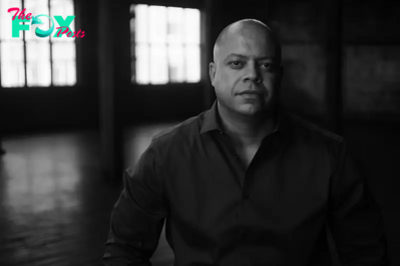
 Entertainment8h ago
Entertainment8h agoJJ Velazquez on Finding Freedom, From Sing Sing to Sing Sing
-
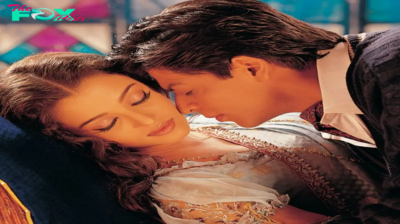
 Entertainment13h ago
Entertainment13h ago13 Most Romantic Movies Based on Novels
-

 Entertainment13h ago
Entertainment13h agoThe Monkey Is the Secret Hero of Gladiator II
-
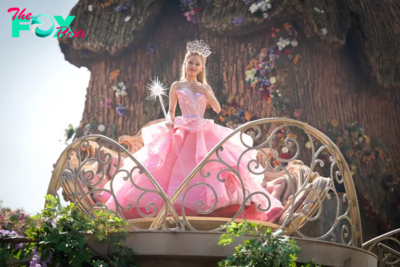
 Entertainment13h ago
Entertainment13h agoHow Wicked Connects to The Wizard of Oz


